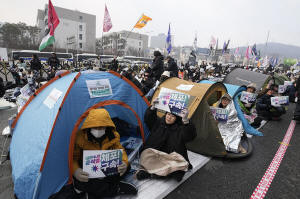South Korean anti-corruption agency asks police to take over efforts to
detain impeached Yoon
 Send a link to a friend
Send a link to a friend
 [January 06, 2025]
By KIM TONG-HYUNG [January 06, 2025]
By KIM TONG-HYUNG
SEOUL, South Korea (AP) — South Korea’s anti-corruption agency has
requested that police take over efforts to detain impeached President
Yoon Suk Yeol after its investigators failed to bring him to custody
following a standoff with the presidential security service last week.
The agency and police confirmed the discussion on Monday, hours before
the one-week warrant for Yoon’s detention was to expire.
The Seoul Western District Court last Tuesday issued a warrant to detain
Yoon and a separate warrant to search his residence after the embattled
president defied authorities by refusing to appear for questioning over
his short-lived martial law decree on Dec. 3. But executing those
warrants is complicated as long as Yoon remains in his official
residence.
Yoon has described his power grab as a necessary act of governance
against a liberal opposition bogging down his agenda with its
legislative majority and has vowed to “fight to the end” against efforts
to oust him. While martial law lasted only several hours, it set off
turmoil that has shaken the country’s politics, diplomacy and financial
markets for weeks and exposed the fragility of South Korea’s democracy
while society is deeply polarized.
The Corruption Investigation Office for High-Ranking Officials will
likely seek a new court warrant to extend the window for Yoon’s
detention, according to police, which said it was internally reviewing
the agency’s request. It wasn’t immediately clear whether the
anti-corruption agency will make another attempt to detain Yoon on
Monday before the deadline expires at midnight.

The anti-corruption agency has faced questions about its competence
after failing to detain Yoon on Friday, and police have the resources to
possibly make a more forceful attempt to detain him.
Yoon’s legal team claimed in a statement that the agency’s move to
delegate execution of the detainment warrant to police is illegal,
saying there’s no legal grounds for it to delegate certain parts of an
investigation process to another agency. Yoon’s lawyers had submitted an
objection to the warrants against the president on Thursday, but the
Seoul Western District Court dismissed the challenge on Sunday.
Yoon’s lawyers also on Monday filed complaints with public prosecutors
against the anti-corruption agency’s chief prosecutor, Oh Dong-woon, and
six other anti-corruption and police officers for orchestrating Friday’s
detainment attempt, which they claim was illegal.
The lawyers also filed complaints against the country’s acting national
police chief, the acting defense minister and two Seoul police officials
for ignoring the presidential security service’s request to provide
additional forces to block the detention attempt. The lawyers said they
also plan to file complaints against some 150 anti-corruption and police
investigators who were involved in Friday’s detention attempt.
The anti-corruption agency, which leads a joint investigation with
police and military investigators, has been weighing charges of
rebellion after Yoon declared martial law and dispatched troops to
surround the National Assembly. Lawmakers who managed to get past the
blockade voted to lift martial law hours later.

[to top of second column]
|

Protesters demanding the arrest of impeached South Korean President
Yoon Suk Yeol attend a rally near the presidential residence in
Seoul, South Korea, Monday, Jan. 6, 2025. The letters read "Arrest
Yoon Suk Yeol." (AP Photo/Ahn Young-joon)

Yoon’s presidential powers were suspended after the
opposition-dominated National Assembly voted to impeach him on Dec.
14, accusing him of rebellion, and his fate now lies with the
Constitutional Court, which has begun deliberations on whether to
formally remove Yoon from office or reinstate him.
Dozens of anti-corruption agency investigators and assisting police
officers attempted to detain Yoon on Friday but retreated from his
residence in Seoul after a tense standoff with the presidential
security service that lasted more than five hours.
After getting around a military unit guarding the residence’s
grounds, the agency’s investigators and police were able to approach
within 200 meters (about 218 yards) of Yoon’s residential building
but were stopped by a barricade comprising around 10 vehicles and
approximately 200 members of the presidential security forces and
troops. The agency said it wasn’t able to visually confirm whether
Yoon was inside the residence.
The agency has urged the country’s acting leader, Deputy Prime
Minister Choi Sang-mok, to instruct the presidential security
service to comply with their execution of the detainment warrant.
Choi has yet to publicly comment on the issue.
In a video message on Sunday, Park Jong-joon, chief of the
presidential security service, hit back against criticism that his
organization has become Yoon’s private army, saying it has legal
obligations to protect the incumbent president. Park said he
instructed his members to not use violence during Friday’s standoff
and called for the anti-corruption agency and police to change their
approach.
Park and his deputy defied summonses on Saturday from police, who
planned to question them over the suspected obstruction of official
duty following Friday’s events. Staff from the presidential security
service were seen installing barbed wire near the gate and along the
hills leading up to Yoon’s residence over the weekend, possibly in
preparation for another detention attempt.

Yoon’s lawyers argued the detention and search warrants against the
president cannot be enforced at his residence due to a law that
protects locations potentially linked to military secrets from
search without the consent of the person in charge — which would be
Yoon. They also argue the anti-corruption office lacks the legal
authority to investigate rebellion charges.
Hundreds of South Koreans rallied near Yoon’s residence for hours
into early Monday, wrapping themselves in silver-coated mats against
the freezing temperatures. It was their second consecutive night of
protests, with demonstrators calling for his ouster and arrest.
All contents © copyright 2024 Associated Press. All rights reserved |